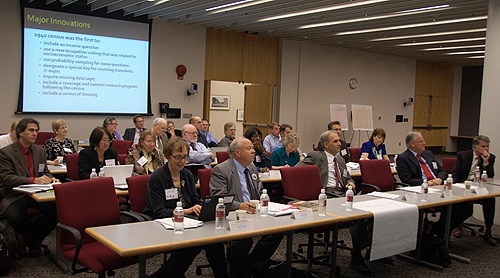
NCAST-Events-1940 Census

Monday, September 13, 2010, National Archives at College Park, Maryland
In preparation for the release of the 1940 Census on April 2, 2012 - which will be, for the first time, available digitally - a workshop hosted at the National Archives at College Park, MD was held in partnership with four agencies: the U.S. Census Bureau, the National Science Foundation, NARA, and the University of Maryland College Park. The workshop was videotaped, and presentations are available as PowerPoint (PDF).
Workshop Participants included social scientists, historians, representatives of social science research and data centers, computer scientists, and officials of NARA and other agencies. While discussions centered around the 1940 population census, key planning strategies emerged to investigate possible ways to enhance the value of the scanned records for scholarly and scientific research through advanced computer methods that will facilitate access to other socio-economic data sets.
The workshop agenda focused on the following goals:
- Increase the usefulness of the scanned images for historical, social, scientific, and other research;
- Expand the possible types of research;
- Examine possibilities for NARA to collaborate with another institution serving some or all of the relevant populations of researchers;
- Further scholarship through the introduction of technological tools that can exploit a wider applicability.
For more information about the release of the 1940 Census records on April 2, 2012, visit http://www.archives.gov/genealogy/census/1940/index.html
Agenda | Presenter Biographies
Welcome
- David S. Ferriero, Archivist of the United States, National Archives and Records Administration (NARA)
- Dr. Robert M. Groves, Director, U.S. Census Bureau PPT
- Dr. Joseph F. JaJa, Interim Vice President, University of Maryland, College Park, MD
- Dr. Sylvia Spengler, Program Director, Division of Information and Intelligent Systems, National Science Foundation (NSF)
Panel 1: Current Government Capabilities and Initiatives
Chair: Dr. Michael Kurtz, Assistant Archivist for Records Services, Washington, DC, NARA
Panelists:
- Martin Jacobson, Director of Special Media Preservation Division,
NARA- "Current NARA Digitization Efforts with the 1940 Census"
PPT
- Rebecca Warlow - "NARA"s On-line Public Access to the 1940 Census" PPT
Panel 2: Research Uses of Census Data
Chair: Dr. Todd Gardner, Survey Statistician, Center for Economic Studies, U.S. Census Bureau
Panelists:
- Dr. John Logan, Professor of Sociology and Director, Initiative on Spatial Structure in the Social Sciences, Brown University - "Research with the 1880 Census Full Count Microdata and its Implications for the 1940 Census"
PPT
- Dr. Vernon Burton, Professor of History, Clemson University and Associate Director of Humanities, Arts, and Social Sciences, Clemson Cyber Institute - "The 1940 Census Counts, and Counting is important to Our History"
PPT
- Dr. Lynne Horiuchi, Visiting scholar, Institute of Governmental Studies, University of California at Berkeley "Relating Architectural and Urban History to the 1940 Census" PPT
Panel 3: Advanced Technologies for Exploiting Census Data
[icon-link label=" Video Panel 3" icon="video-camera" classes="" link="http://www.youtube.com/watch?v=CL2sBNVbmJk" /]
Chair: Dr. Sylvia Spengler, Program Director, Division of Information and Intelligent Systems, National Science Foundation (NSF)
Panelists:
- Dr. Peter Bajcsy, National Center for Supercomputing Applications, University of Illinois at Urbana-Champaign - "Exploiting Imaging and Web Technologies to Provide a Comprehensive View of Census Data"
PPT
- Dr. Richard Marciano, Director, Sustainable Archives & Library Technologies Laboratory (SALT); Professor, School of Library and Information Science, University of North Carolina at Chapel Hill; and Chief Scientist, Renaissance Computing Institute (RENCI)
PPT
- Panel 4: Perspectives Beyond the 1940 Census
Chair: Dr. Neil Fraistat, Professor of English, University of Maryland, and Director, Maryland Institute for Technology and the Humanities (MITH), University of Maryland
Panelists:
- Dr. Margo Anderson
- Dr. Steven Ruggles
- Dr. Kelly A. Woestman
Wrap-up: Facilitated Discussion of Possibilities with Identification of any Action Items
Facilitators:
- Dr. Kenneth Thibodeau, Director, Center for Advanced Systems and Technologies, NARA
- Dr. Bruce Ambacher, Visiting Professor, College of Information Studies, University of Maryland